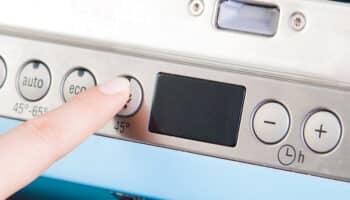We've independently reviewed this article to make sure it's as accurate as we can make it.
To find out more about our article creation and review process, check out our editorial guidelines.
Stuck trying to figure out why your dishwasher is making your glasses feel gritty?
You’re not alone! You’ve come to the right place for answers.
If your dishwasher is leaving grit on your glasses, chances are you’re not using a rinse aid, you have hard water, or your filter and spray arms are dirty. Using the wrong temperature or detergent could also explain the issue.
Read on to learn how to get rid of the issue!
Why trust us? This article was written by Craig Anderson and James Blackford. Craig has been covering appliance repair online for 6 years, helping solve thousands of appliance issues. James has over 16 years of experience as an appliance technician, works as a Master Technician for SquareTrade, and runs his own appliance repair company.
How to Stop Your Dishwasher From Leaving Gritty Residue On Your Glasses
There are different reasons why your dishwasher is leaving grit on your glasses. Some of the most common ones are:
#1 Hard Water
If your dishwasher leaves your glasses feeling gritty, please check whether you have hard water issues.
I recommend purchasing a test kit from any home improvement store or online retailer, such as Amazon.
You see, mineral deposits can be left behind on the surfaces of your dishes. Luckily, there are different solutions you can try.
In my experience, adding two teaspoons of table salt to the soap dispenser before adding the soap can help you maintain your glasses sparkly, even if you have hard water.
I also recommend using a dishwasher detergent specifically designed for hard water or filling a cup with regular vinegar up to 1/4 of its capacity and placing it on the top rack.
As your dishwasher fills with water, the cup will slowly release the vinegar, which will help remove any buildup and keep your dishwasher clean.
#2 Dirty Filter
In my experience, your dishwasher can also leave specks of grit and dirt on your glasses due to a dirty filter and base.
Food and particles accumulate at the base and in the filter over the course of several wash cycles. If the particles are too large to be broken down, they will get caught in the filter with nowhere to go except back onto your dishware.
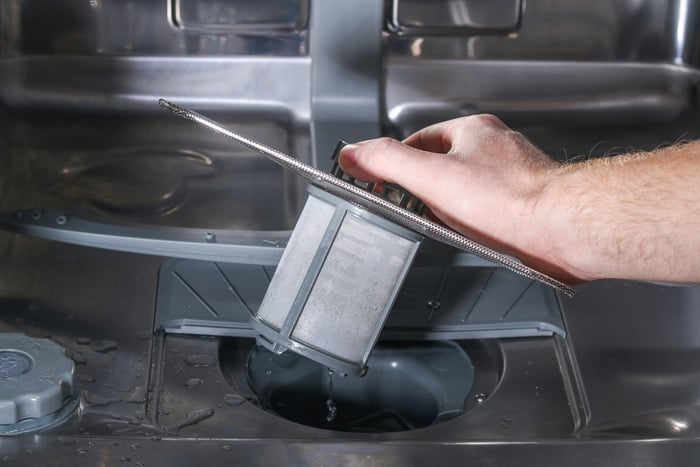
To clean the filter, simply pull it out, soak it in hot, soapy water for roughly an hour, and scrub it down with a wire or stiff nylon brush. Rinse the filter off and place it back in the unit.
To keep your glasses from feeling gritty again, simply clean the filter on a regular basis.
#3 Your Dishwasher Base Is Dirty
In my experience, if your dishwasher continues to leave grit on your glasses even after cleaning the filter, the base of the unit is likely also dirty.
Grime tends to accumulate at the base of your dishwasher and moves around easily during the wash cycle. This is commonly the result of an overflow from the filter.
Once the filter has been thoroughly cleaned, take the time also to clean your dishwasher. Ultimately, it would be best to wipe down the unit’s interior before washing another set of dishes.
To deep clean your dishwasher, please use a dishwasher sanitizer every 6 months. I also recommend using cleaning tablets every month or so to eliminate any leftover bacteria in your dishwasher.
For the ones who prefer a natural alternative, you can set a dishwasher-safe cup of white vinegar on the top rack of your dishwasher.
Then, run an empty hot water wash cycle to remove any grime that has built up on the inside of the unit, while also eliminating any lingering food odors.
#4 Clogged Drain Hose
If your dishwasher is leaving a gritty residue on your glasses, it is often due to a clogged hose that can’t drain debris from the appliance.
To check the drain hose, you’ll need to open up the cabinet next to your dishwasher. The drain hose will enter the area from your dishwasher and will likely connect to the garbage disposal. In some cases, it can be directly connected to the drainpipe under the sink.
Make sure you have a bucket or large bowl ready, as water is likely to come out when you detach the hose from the disposal.
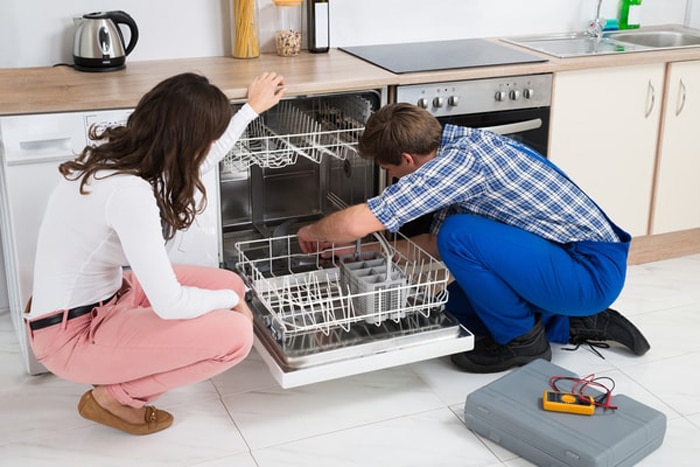
Clean out the hose thoroughly to ensure the water is able to flow freely through it. More than likely, you’ll find small food particles blocking it.
Then, reconnect the hose, and run your dishwasher through a cycle to see if your glasses have stopped feeling gritty. If not, move on to the next possible cause.
#5 Blocked Spray Arms
Blocked spray arms are another reason why your dishwasher is leaving grit on your glasses. Food debris and hard water can easily clog the small holes in the spray arms.
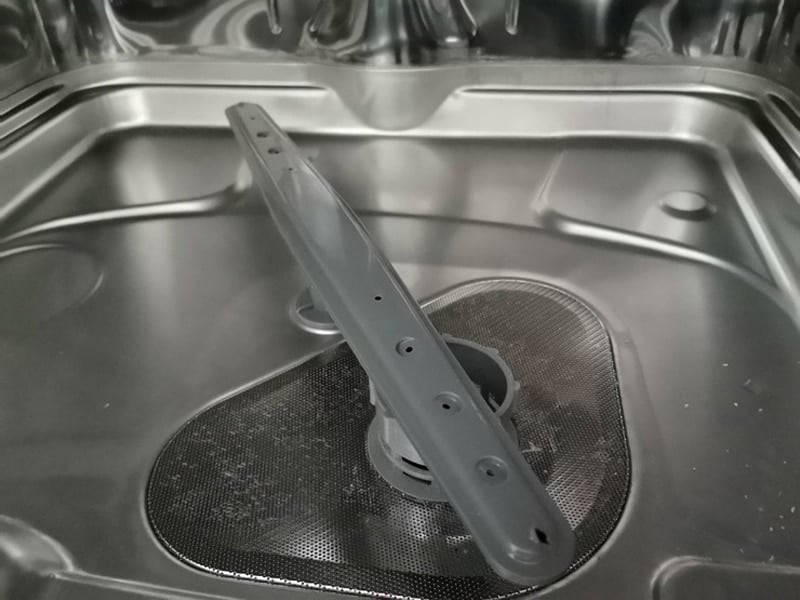
To clean the spray arms, you’ll need to remove them (they’re located above the top and below the bottom racks of the unit) with a screwdriver. In some models, you can also spin the arms counterclockwise to remove them.
I recommend soaking them in white vinegar overnight to help loosen the built-up grime and food particles. Then, carefully insert a small piece of wire into the small holes to loosen any debris caught inside.
Another problem that can keep the spray arms from working properly and causing gritty glasses is dishes blocking the arms. Thus, make sure that nothing is in the way of the arms functioning properly.
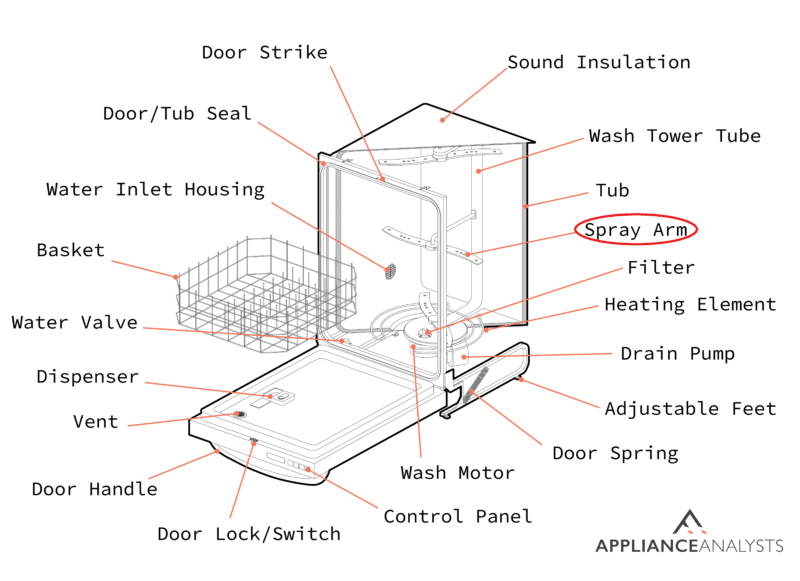
Don’t forget to place your dishes facing toward the center and large items at the back.
If you notice that the spray arms are broken or damaged, you’ll need to replace them. Please refer to your manufacturer’s manual, as the process can vary depending on your dishwasher’s model.
#6 You’re Not Using a Rinse Aid
Ensuring the rinse aid dispenser is full can help you keep your dishwasher from leaving grit on your glasses again.
You see, rinse aid lowers the surface tension of water, which helps prevent water spots from forming on glasses and improves the cleanliness of your dishes.
You simply need to remove the small cap that covers the rinse aid compartment. Then, you’ll notice a plastic dial inside that has a “min” and “max” mark. Make sure it’s set to the max level.
You can buy a rinse aid at every supermarket or online retailer, such as Amazon. They typically cost $5 to $15.
#7 The Water Temperature Is Too Cold
Your dishwasher can leave a gritty residue on your glasses if the water temperature is not at 120ºF.
Dishwashers and sinks usually share a hot water line. So, if you don’t have a thermostat, place your hand under the running water in your sink to check the temperature.
If the water feels too hot, and you need to pull your hand away after just a few seconds, the temperature is probably within the desired range.
You also need to ensure that your dishwasher is connected to the hot water supply line rather than the cold water supply line. If your dishwasher is connected to the cold water supply, it can leave a gritty residue on your glasses.
It’s a simple fact: cold water doesn’t clean as effectively as hot water.
Note: check your unit’s manual to make sure that your dishwasher is designed to work with the hot water supply line. Some modern dishwashers are actually designed to hook up to either the hot or cold water supply, as they can heat the water on their own internally.
If you’re dealing with water that is not hot enough, and you’ve adjusted the temperature on your water heater, I recommend speaking to a professional. There’s a good chance there’s an issue with your dishwasher’s thermostat or heating element.
#8 The Wash Cycle Is Too Short
If you feel roughness when picking up your glasses from the dishwasher, there’s a good chance the wash cycle you’re using is too short.
So, if you have a full load of dishes, it’s important you run not only a hot but also a long wash cycle. It should never run on a short cycle.
While short wash cycles are designed to be more efficient and save water, these quick cycles are not full wash cycles. Thus, when compared to a longer cycle, a quick wash cycle is unlikely to remove any caked-on food particles and grime from your dishes.
If you have a small load of dishes, a short wash cycle is likely enough and won’t leave you removing gritty glasses from your dishwasher at the end of the cycle.
#9 You’re Using a Low-Quality Detergent
A low-quality dishwashing detergent can cause a gritty residue to be left behind on your dishes, as the soap won’t clean properly. In fact, it may not even completely dissolve throughout the wash cycle.
Ensure you’re using the correct amount of dishwashing detergent to keep your dishwasher from leaving specks and spots on your glasses. Too much detergent won’t dissolve entirely during the wash cycle.
If you’re using a high-quality detergent, chances are the dispenser door is blocked, preventing it from opening fully during the wash cycle. It’s also likely that the door is faulty and requires repair.
Keep larger dishes away from the door to ensure the door opens correctly.
Conclusion
I hope the tips above have helped you stop your dishwasher from leaving a gritty residue on your glasses.
Remember to check for hard water issues, unclog the drain hose, and clean your dishwasher’s filter and base.
Don’t forget to unclog the spray arms and use the correct wash cycle, water temperature, and detergent.
If your dishwasher continues to leave grit on your glasses, consider contacting a professional for further assistance. In the meantime, consider checking out some of our other articles below, and thanks for reading!







